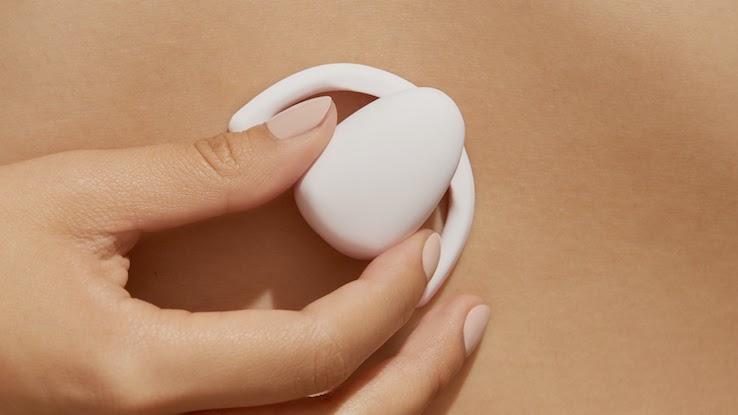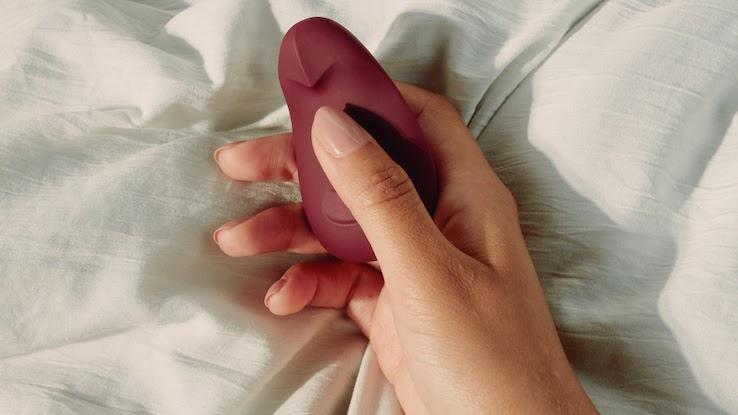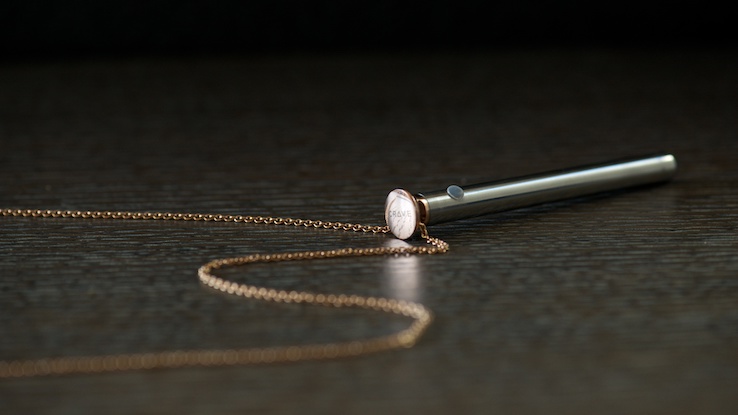
When it comes to sex toys, the days of the bright pink, phallic, vibrating object as the dominant choice in the market are over. Fortunately, the days of going to a seedy-looking sex shop to buy one of those adult toys and feeling guilty about it are also pretty much done.
“It’s important to have thoughtful well-designed products that are designed for women. The vast majority of what we’ve seen was designed by men at women […]. They just didn’t really fully embrace the user of these products,” says Ti Chang over a Zoom video chat. Chang is co-founder and VP of Design at the sex tech company Crave, which was founded in 2010 after the industrial designer Chang had already launched a line of sex jewelry called INCOQNITO in 2008.
Crave products are sold through the company’s website but also at mainstream retailers like Nordstrom, where they’re available in-store and online.
Dame Products co-founder and CEO, Alexandra Fine, seems to be on the same page as Chang when it comes to the evolution of sex toys. Over email, she tells me about Dame Labs, the research arm of her sex tech company, where customers inform the process of product development — “from the type of stimulation a product provides to where each button is placed,” she writes, adding they test their products with real people. “The Dame community is working to humanize a product space that isn’t always speaking to the audience it serves.”
Dame, which launched in 2014 and was founded by sexologist Fine and engineer Janet Lieberman, has a team of full-time engineers to ensure their products are based on research and also get all the technological sophistication they need as standard consumer products.
Browse the products by Dame and Crave but also those by other leading sex tech companies — such as Lora DiCarlo, Lelo and Womanizer — and you’ll see a diversity of offerings. And I don’t mean just in terms of the colors you can choose from, but also in the shapes, sizes, materials and functions of the devices. There are waterproof toys, flexing vibrators, hands-free devices, suction stimulators, pleasure products that are designed for solo play and those for use with a partner. There are even small, inconspicuous gadgets ideal to take with you while traveling.
You’ll also see mainly people with vulvas or vulva-owners — terms used by Chang and Fine to describe their users — represented on those companies’ websites. “The sex industry is on an exciting swing from a male-centric vice industry to a female-centric wellness industry,” says Fine.
When Pleasure Meets Wellness
Almost perfectly aligned with this lineup of sex tech companies catering to people wanting to be more in touch with their pleasure, we find the resurgence of the so-called sex-positivity movement. Think of Phoebe Waller-Bridge’s show Fleabag as an excellent contemporary introduction to this movement or ideology that promotes sexuality as a natural part of being a human and aims to remove stigma and shame from sex. Sex-positivity encourages being open-minded, non-judgmental and respectful of personal sexual autonomy. And it emphasizes safe sex and consent.

“Sex is becoming a more public part of everyday conversation, which helps shed light on high-quality products within the industry,” says Fine. “We’re seeing it more openly discussed in pop culture, which helps validate and sanction products that were once shamed.”
Not only that, but Dame, Crave and other sex tech companies can also play an integral part in bringing the sexual conversation to the forefront by helping us gain a better understanding of our pleasure and sexuality. “We believe that our toys can help vulva-owners understand their own ‘pleasure map,’ and help them enhance sexual pleasure and communication with their partner (and themselves). More pleasure means better sleep, less stress and overall improved wellbeing. Vibrators are also amazing tools for folks who have low libido, cancer patients and abuse survivors, among others, to reconnect with themselves in a safe low-pressure atmosphere,” says Fine.
“The reason why we haven’t had well-designed sex toys [in the past] is because of the archaic attitude that did not value female pleasure and sexuality,” Chang says, referring to the pervasive cultural stigma associated with women’s pleasure. “We’re emerging out of that darkness. Female pleasure is every bit a part of a woman’s wellbeing as mental health, physical health and their sexual health.”
To make information about sex accessible to anyone, regardless of their “gender, sexual orientation or level of sexual engagement,” Dame Products launched Swell in early 2020. It’s a digital platform that explores sexual wellness and human intimacy. The site includes a very educational glossary that explains the meanings of all sorts of sexual terms, from “sexting” to “pelvic floor.” Swell — which is written by journalists, therapists, sex educators, activists, essayists and health experts — also offers an array of articles on topics ranging from sex during pregnancy to logistics of conception while being transgender and how to make long-distance relationships work.
The Importance of Design
Part of the reason why I was able to mention five sex tech companies in this article, while still managing to leave some names out, is also due to the way current pleasure products look.

If the days of the big phallic vibrator are over, the days of hiding sex toys away are also numbered. Take Crave’s Vesper, for instance. This small and elegant vibrator — available in silver, rose gold and 24kt gold — can also be worn very publicly as a necklace.
While designing the Vesper, Chang was very aware of the taboo around sex and women’s pleasure. She thought that, to remove that taboo, more people needed to start talking about it. “It was intentional to create a conversational piece, that it’s a statement necklace that you can wear out but it’s also a functioning vibrator,” she says. “I’m not saying everyone has to wear a vibrator out, but women doing it are starting conversations with friends, sometimes with family.”
The designer also talks about how sex jewelry has become an iconic symbol of empowerment.
Fine also sees Dame Products as empowering tools, but she points out the importance of eliminating many of the lingering biases within the pleasure market — like the fact that they’re prohibited from many modes of advertising on social media platforms and also in physical spaces. Dame Products sued New York’s Metropolitan Transit Authority in June of 2019 for rejecting its ads and saying the transit authority perpetuates a double standard. The case is still active.
“We need to continue to urge advertisers to treat sexual wellness solutions for all sexes and genders equally in how they approve or deny advertisements, whether they are ED [erectile dysfunction] medications, vibrators, lubricants, condoms, dildos, dilators or books. This leveling of the playing field is crucial to ensure all people have access to the products and solutions they need, as well as continue to break the stigma surrounding sexuality and sex toys specifically — that’s what sex positivity means to us,” says Fine.






